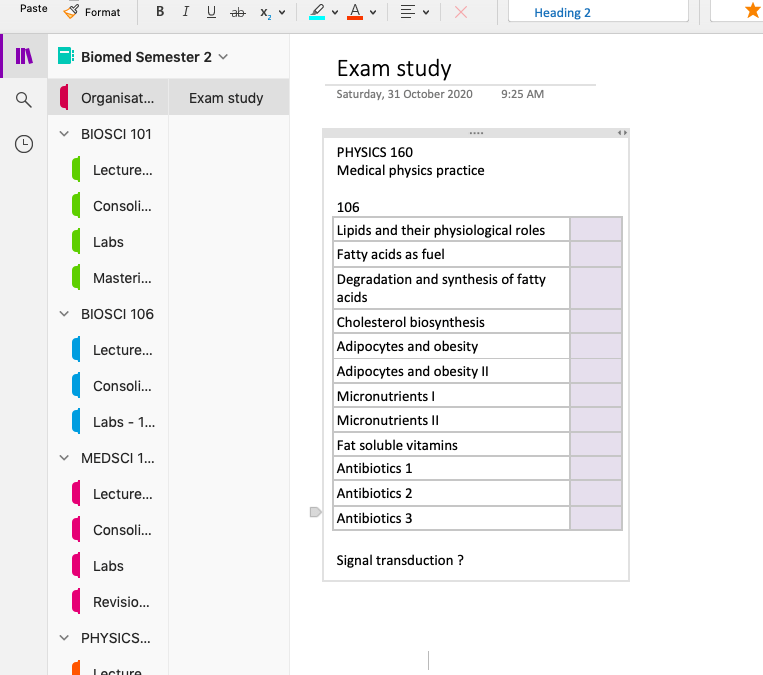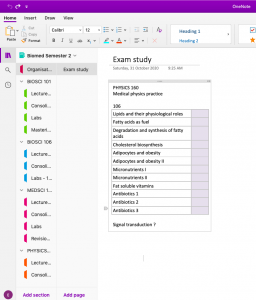It’s strange to think first year is already over, just like that! Now that I’ve made it through to the other side, I thought I would share some information and reflections that might help those planning to do biomed or health sci in 2021 or beyond. My experience will be most relevant for those doing biomed, but should also be useful for prospective health sci students when I am discussing the core papers (BIOSCI107, CHEM110, POPLHLTH111 and MEDSCI142).
Timetabling
Luckily in biomed, for those wanting to apply for clinical programmes (medicine, medical imaging, optometry and pharmacy) we only have to choose our General Education, which makes timetabling a bit easier. At the end of last year I just had to choose which of the pre-made timetable options I wanted. This was partially dictated by my Gen Ed, which was only offered in the afternoon, meaning that it made sense for me to have my biomed lectures in the morning.
To be honest, I stressed too much about my timetable, so if I had my time again I wouldn’t worry too much about it. Some things to think about are:
- When do you work best? I work best in the morning so went for morning lectures since we had lectures most days and only labs a couple of times a week, but other morning people went for morning labs, since you are actually assessed in labs and not in lectures – so up to you!
- How spaced out do you want your labs to be? Since labs can require a bit of prep (especially MEDSCI142 labs) it might be useful to have them spaced out (rather than on consecutive days, or 2 labs on the same day). However, effective planning and organisation allowed me to manage back-to-back labs/tutorials (for the few on-campus labs we had anyway).
- Do you want big gaps between classes? Especially if you are living at home, you might want to think about gaps between classes. (E.g. I had a three-hour gap in semester one a few days a week since my morning lectures finished at 1 pm and my Gen Ed wasn’t until 4 pm. This was pretty much a non-issue due to the switch to online learning and would also be fine if you were happy to fill in this time on campus, but it’s definitely something to consider).
Gen Ed – what actually is a Gen Ed?
A Gen Ed paper is one that you have to choose from outside your degree to widen the scope of your learning. In biomed and health sci, you have to do a Gen Ed course in first year (during semester 1 for biomed and semester 2 for health sci).
I decided on my gen-ed (SCIGEN101G) both based on my interests and the assessment style. I really enjoyed it because you can choose your own topic for the assignments so it is easy to tailor to your interests. MAORI130G is also very popular along with other options such as philosophy and economics. I found looking at course overviews and student course review helpful to get an idea of what the course is about, although it’s probably best to take some of the student course reviews with a grain of salt 🙂
Staying organised
Having a good organisation system helped me manage both deadlines and my stress levels. As an overview, I made a giant table on Microsoft OneNote and labelled it to make a calendar. I added deadlines, tests and exams in bold and typed other things I needed to do into the boxes that corresponded to each day. I also used OneNote for my lecture notes for some courses (BIOSCI107, POPHLTH111, BIOSCI106 and BIOSCI101). I would upload a pdf of the slides that I could type extra notes on top of during the lecture. I loved using OneNote because of this functionality and also because I could arrange each course inside a notebook with subsections for lecture notes, consolidation and lab preparation/notes.
My OneNote notebook for Semester 2 – as a student you can download OneNote for free 🙂
Support network
In a competitive course and with the big life change of starting university I found having a good support network really important. I made sure to keep up with my friends and family as much as possible and also found it helpful to talk to others who had been through this experience, e.g. through the Women in Health Network’s (WiHN) mentoring program. This program pairs you with a mentor who is a 2nd year+ student in a health program and WiHN also run events such as “Where to from here?” which discusses different career options available for students studying first year biomed or health sci, which I found very insightful.
Mindset
One last thing that I think is important to mention is the importance of mindset when approaching a challenge like first-year biomed. Although I was stressed at times, I tried to keep a positive headspace as much as possible and focussed on things I could control instead of worrying about things I had no influence over. I made an effort to enjoy the learning opportunities and felt that this helped me get the most out of my first year of university.

